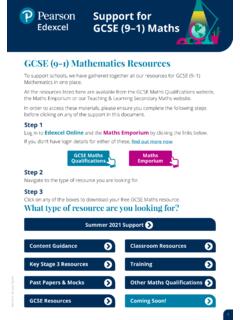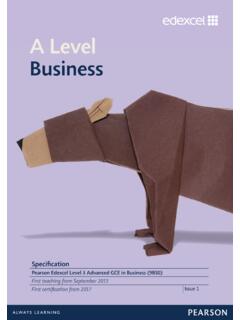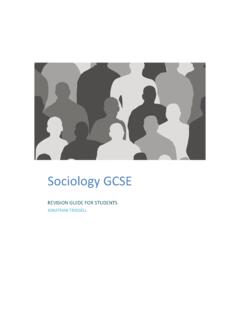Transcription of Science programmes of study: key stage 4 - GOV.UK
1 Science programmes of study: key stage 4 National curriculum in England December 2014 Science key stage 4 2 Contents Introduction 3 Working scientifically 5 Subject content Biology 7 Subject content Chemistry 11 Subject content Physics 14 Science key stage 4 3 Introduction Teaching in the sciences in key stage 4 continues with the process of building upon and deepening scientific knowledge and the understanding of ideas developed in earlier key stages in the subject disciplines of biology, chemistry and physics. For some students, studying the sciences in key stage 4 provides the platform for more advanced studies, establishing the basis for a wide range of careers. For others, it will be their last formal study of subjects that provide the foundations for understanding the natural world and will enhance their lives in an increasingly technological society.
2 Science is changing our lives and is vital to the world s future prosperity, and all students should be taught essential aspects of the knowledge, methods, processes and uses of Science . They should be helped to appreciate the achievements of Science in showing how the complex and diverse phenomena of the natural world can be described in terms of a number of key ideas relating to the sciences which are inter-linked, and which are of universal application. These key ideas include: the use of conceptual models and theories to make sense of the observed diversity of natural phenomena the assumption that every effect has one or more cause that change is driven by interactions between different objects and systems that many such interactions occur over a distance and over time that Science progresses through a cycle of hypothesis, practical experimentation, observation, theory development and review that quantitative analysis is a central element both of many theories and of scientific methods of inquiry.
3 The sciences should be taught in ways that ensure students have the knowledge to enable them to develop curiosity about the natural world, insight into working scientifically, and appreciation of the relevance of Science to their everyday lives, so that students: develop scientific knowledge and conceptual understanding through the specific disciplines of biology, chemistry and physics; develop understanding of the nature, processes and methods of Science , through different types of scientific enquiry that help them to answer scientific questions about the world around them; develop and learn to apply observational, practical, modelling, enquiry, problem-solving skills and mathematical skills, both in the laboratory, in the field and in other environments; Science key stage 4 4 develop their ability to evaluate claims based on Science through critical analysis of the methodology, evidence and conclusions, both qualitatively and quantitatively.
4 Curricula at key stage 4 should comprise approximately equal proportions of biology, chemistry and physics. The relevant mathematical skills required are covered in the programme of study for mathematics and should be embedded in the Science context. Working scientifically is described separately at the beginning of the programme of study, but must always be taught through and clearly related to substantive Science content in the programme of study. Teachers should feel free to choose examples that serve a variety of purposes, from showing how scientific ideas have developed historically to reflecting modern developments in Science and informing students of the role of Science in understanding the causes of and solutions to some of the challenges facing society.
5 The scope and nature of their study should be broad, coherent, practical and rigorous, so that students are inspired and challenged by the subject and its achievements. Science key stage 4 5 Working scientifically Through the content across all three disciplines, students should be taught so that they develop understanding and first-hand experience of: 1. The development of scientific thinking the ways in which scientific methods and theories develop over time using a variety of concepts and models to develop scientific explanations and understanding appreciating the power and limitations of Science and considering ethical issues which may arise explaining everyday and technological applications of Science ; evaluating associated personal, social, economic and environmental implications.
6 And making decisions based on the evaluation of evidence and arguments evaluating risks both in practical Science and the wider societal context, including perception of risk recognising the importance of peer review of results and of communication of results to a range of audiences. 2. Experimental skills and strategies using scientific theories and explanations to develop hypotheses planning experiments to make observations, test hypotheses or explore phenomena applying a knowledge of a range of techniques, apparatus, and materials to select those appropriate both for fieldwork and for experiments carrying out experiments appropriately, having due regard to the correct manipulation of apparatus, the accuracy of measurements and health and safety considerations recognising when to apply a knowledge of sampling techniques to ensure any samples collected are representative making and recording observations and measurements using a range of apparatus and methods evaluating methods and suggesting possible improvements and further investigations.
7 Science key stage 4 6 3. Analysis and evaluation applying the cycle of collecting, presenting and analysing data, including: presenting observations and other data using appropriate methods translating data from one form to another carrying out and representing mathematical and statistical analysis representing distributions of results and making estimations of uncertainty interpreting observations and other data, including identifying patterns and trends, making inferences and drawing conclusions presenting reasoned explanations, including relating data to hypotheses being objective, evaluating data in terms of accuracy, precision, repeatability and reproducibility and identifying potential sources of random and systematic error communicating the scientific rationale for investigations, including the methods used.
8 The findings and reasoned conclusions, using paper-based and electronic reports and presentations. 4. Vocabulary, units, symbols and nomenclature developing their use of scientific vocabulary and nomenclature recognising the importance of scientific quantities and understanding how they are determined using SI units and IUPAC chemical nomenclature unless inappropriate using prefixes and powers of ten for orders of magnitude ( tera, giga, mega, kilo, centi, milli, micro and nano) interconverting units using an appropriate number of significant figures in calculations. Science key stage 4 7 Subject content Biology Biology is the Science of living organisms (including animals, plants, fungi and microorganisms) and their interactions with each other and the environment.
9 The study of biology involves collecting and interpreting information about the natural world to identify patterns and relate possible cause and effect. Biology is used to help humans improve their own lives and to understand the world around them. Students should be helped to understand how, through the ideas of biology, the complex and diverse phenomena of the natural world can be described in terms of a number of key ideas which are of universal application, and which can be illustrated in the separate topics set out below. These ideas include: life processes depend on molecules whose structure is related to their function the fundamental units of living organisms are cells, which may be part of highly adapted structures including tissues, organs and organ systems, enabling life processes to be performed more effectively living organisms may form populations of single species, communities of many species and ecosystems, interacting with each other.
10 With the environment and with humans in many different ways living organisms are interdependent and show adaptations to their environment life on Earth is dependent on photosynthesis in which green plants and algae trap light from the Sun to fix carbon dioxide and combine it with hydrogen from water to make organic compounds and oxygen organic compounds are used as fuels in cellular respiration to allow the other chemical reactions necessary for life the chemicals in ecosystems are continually cycling through the natural world the characteristics of a living organism are influenced by its genome and its interaction with the environment evolution occurs by the process of natural selection and accounts both for biodiversity and how organisms are all related to varying degrees.















